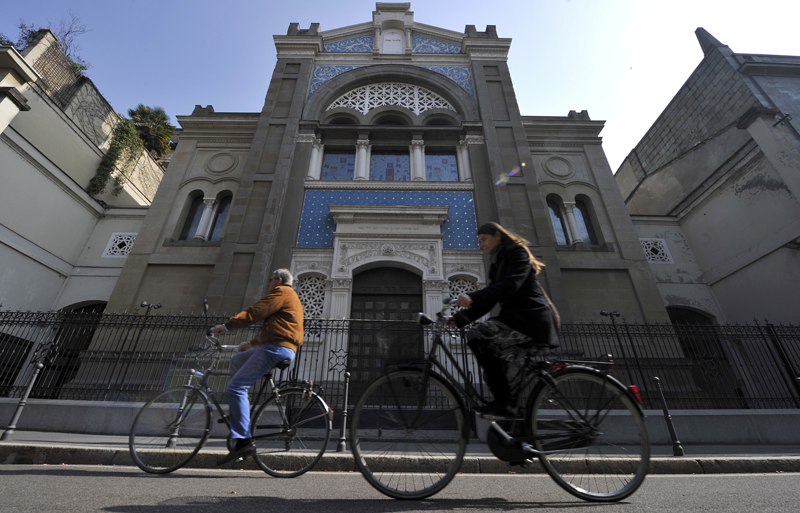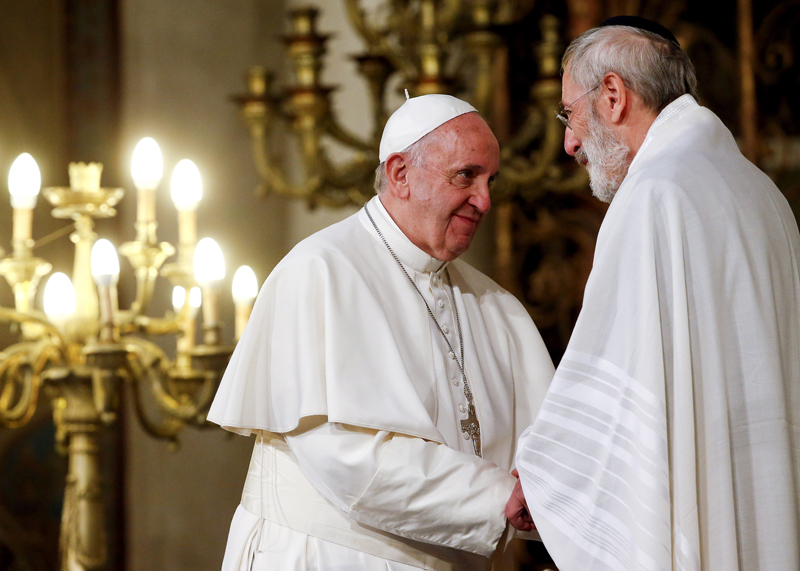
Two people ride bicycles past a synagogue in Milan, Italy on March 15, 2012. Photo courtesy of REUTERS/Paolo Bona
*Editors: This photo may only be republished with RNS-TALMUD-ITALIAN, originally trasmitted on March 30, 2016.
ROME (RNS) One of Judaism’s most central texts, the Talmud, will be published in Italian for the first time as part of a five-year project that merges tradition with modern technology.
Dozens of translators, researchers, historians and other experts have spent five years working on the historic translation of the Babylonian Talmud, which will be released in Italian on Tuesday (April 5).
The project, which began in 2011, won the support of the Italian government, the National Research Council, the Union of Italian Jewish Communities and the Italian Rabbinical College.
The government allocated $5.6 million for the project.
READ: Rome’s Jewish catacombs to open to the public
Riccardo Di Segni, Rome’s chief rabbi, is in charge of the ambitious translation of the text, a compendium of interpretation and commentary by ancient rabbis of the oral law believed to have been given by God to Moses at Mount Sinai.
The Talmud, written over a period of about 600 years, beginning in the first century, is the basis for rabbinical studies. A total of 36 tractates and 5,422 pages have been translated using unique computer technology.

Pope Francis greets chief Rabbi Riccardo Di Segni during his visit at Rome’s Great Synagogue on Jan. 17, 2016. Photo courtesy of REUTERS/Alessandro Bianchi
*Editors: This photo may only be republished with RNS-TALMUD-ITALIAN, originally transmitted on March 30, 2016.
While Di Segni said the new translation will be of interest to many in the Jewish community, he said it would also interest many others because the Talmud covers aspects of law, philosophy, science and the history of religion.
“Despite its obvious complexity, this translation finally offers the Italian reader an essential basis for understanding,” he said.
The team of experts involved in the translation came from various institutions throughout Italy. They used sophisticated software specially developed for the project by the Institute for Computational Linguistics.
Called “Traduco” or “Translate” in Italian, the software is a high-tech program for enabling the translation of ancient texts. It allowed scholars to annotate, comment and exchange information as they worked on the same complex translations.
READ: Poll: Only 50 percent of Italians call themselves Catholic
La Giuntina, a Florence-based publisher that specializes in Jewish books, is publishing the translation in book form. The volume includes the original text of the Babylonian Talmud, written in Hebrew and Aramaic with the Italian translation.
Rabbi Adin Steinsaltz, an Israeli scholar devoted to the Talmud, published several tractates of the Babylonian Talmud in Hebrew and English in an English-Hebrew edition.
“For Jews, the Talmud is an essential book because to a certain degree their existence depends on it,” he said. “But at the same time the Talmud sends a message to the whole world that perhaps the world can begin to understand only now.”
(Josephine McKenna is an RNS correspondent based in Rome)




